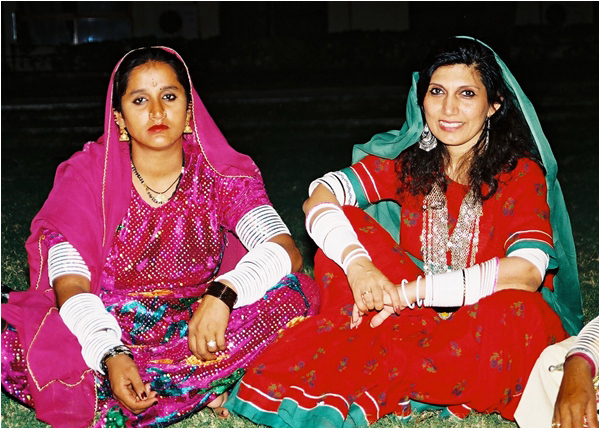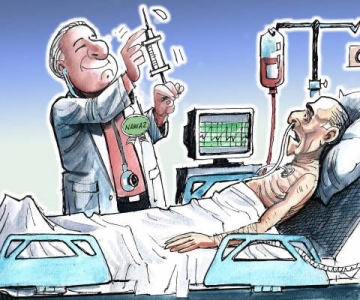By: Raza Rumi Dr Fouzia Saeed with Zarina, a folk singer from Cholistan
I talked to Dr Fouzia Saeed, the newly appointed Executive Director of Lok Virsa
Dr Fouzia Saeed, a scholar and civil society activist, was recently appointed as the head of Lok Virsa the premier government institution to conserve and promote cultural heritage. After years of inaction and treating folklore as a commodity to be sold at melas and cafes, it is somewhat encouraging that a professional is in charge of an important institution. Fouzia is a renowned folklorist. Her well-researched book Forgotten Faces: The daring women of Punjabi theatre traces the lives of women actors active in folk theatre during the 1960 and 70s. Another publication on the lacquered work of Dera Ismail Khan is a useful reference on an old craft that continues to be practiced.
Earlier, Fouzia led the movement for promotion of Manganhaar music encouraging younger people to participate and take pride in that activity. On PTV Fouzia interviewed many artists who had quit performing arts. As the founding member of Sanjh Theatre, she has been actively engaged with the folk arts. In 1988, she joined Lok Virsa as a Deputy Director, Research, and produced a record number of publications. In 1989 she set up a private organization The Folklore Society that she still chairs. Fouzia best known initiative remains Mehergarh a Human Rights institute that provides leadership training and helps build an alternative discourse on culture and society. Her PhD in Education and academic training in anthropology led to her award winning book Taboo that explores the stigma on performing arts in Pakistan; and is now being used as a textbook in many countries.
We spoke to Fouzia as she was leaving for Islamabad to take charge of the institution.
Going back to Lok Virsa as its head must be a homecoming of sorts?
Yes, Nostalgic! When I joined it in 1988 I had just completed my education from the USA and was so full of enthusiasm. It was a thriving and creative place! There was a tea khokha on one side and we used to have samosas there and come up with creative ideas for our programs. I really got groomed there. It is great to come back to it. All these past years I used to call it my maika ghar (parental abode). I know almost all the people there, I also know its glorious as well as subdued past quite well. With all the affection for Lok Virsa, it is great to be back. Not just for the staff and colleagues but also the folk artists that I have maintained close contacts with. They are thrilled and I am thrilled!
How would you comment on what has been happening to the institution in the last few years?
One big issue is determining the priority. How important cultural institutions are to a government or a nation. Are they just there to create some entertainment or is there more vision to it. Secondly, I think the politics really tends to deteriorate an institution. When institutional heads embody a lot of power and think that any one who differs from them should be silenced, the ability to motivate a team gets depleted. The talented people become disgruntled and not so talented ones count on praising the boss, whether right or wrong. Sometimes these people take favours and become loyal to individual boss rather than the institution. These are very common problems in institutions of Pakistan. However the unique thing about Lok Virsa is that there are still people there who are committed to their work and to the institution. It is due to these talented people that I believe there is a very good chance of reviving the institute.
Why has Lok Virsa not been able to make the kind of impact that was imagined at the time of its creation?
If a nation decides to imitate the West and call it modernization, then folk culture turns into decoration pieces in modern houses; or takes the shape of souvenir gifts. If a nation thinks of its folk heritage and be embarrassed or feel it is outdated then the folklore dies and with it the pride of being who we are. The philosophy of Lok Virsa has always been that folk expressions are living arts. In the past, people used to sing songs about local heroes, adhere to traditions that evolve and stay relevant. We don’t have to stop that process.. One question that I ask of myself is whether it will be okay for me to wear a lacha to my work. If the answer is no, I would say, it is not my choice or that I am concerned about people laughing at me? If incorporating our own folk dresses folk, colours and folk crafts into our lives is embarrassing then either we need to transform them or we question the low value we have put on to them. This is a good question for people to test themselves.
I think drifting away from what Faiz Sahib gave as an outline for cultural policy and not being able to institute an overarching vision, were the reasons why Lok Virsa seemed like an an event planning institute to some.
What are the key challenges to the institution and how will you fix them?
I think Lok Virsa used to have one of the most creative teams. Appointments based on political considerations or nepotism based postings affect institutions. Limited budget is another challenge to deal with.
At a larger level unless our folk artists have a market, the institute cannot give them stipends so we have to develop the taste and a market for folk arts. Currently, youngsters do not have exposure or access to what our folk music is. The market is full of Bollywood and modern bands. Therefore, one needs to think of ways to develop the taste of our youth to their folk heritage and its living manifestations.
I think one institute alone cannot do this job. We need to network with provincial arts councils and think of collaborative ways of developing the taste of our youth for their folklore. For the in-house challenges, I think the team needs to be motivated and I am very confident that we would work together very well.
Shouldn’t institutions like Lok Virsa be independent of government control and run by artists, artisans and culture experts?
Lok Virsa is an autonomous body. But let me add that the government should have a mandate to document and promote our cultural heritage. At the same time, such institutions require autonomy to make decisions and hire talented people. Theoretically the institute was conceived like a combination of both. I will soon find out where the balance is. The Minister and the relevant officials of the Ministry, I believe, will be supportive to the institute.
Pakistan plural, folk culture is under threat. Can Lok Virsa play a role in its preservation without the necessary political changes in country policy?
I think everything does get linked to the political situation in the country. I hope the nation stays united in dealing with the current challenges. However, Lok Virsa can definitely play a role in bringing unity in diversity. The recognition of the pluralistic past of our country where common people lived in harmony can serve as a guide for the future.
In the current context where devolution of powers to provinces has somewhat empowered our provinces, Lok Virsa can play a significant role in bringing that diversity together and celebrating it.
What are the three things you are going to do immediately?
I think an Executive Director facilitates to articulate and implement a vision. It is the teamwork, commitment to our fields and loyalty to the Institute that matters. I would do the housekeeping first to get the teams in place for various specialized tasks and budgets readjusted for the next financial year. Then I would reach out to all the cultural institutions and develop links to form a network for future collaboration. Finally, I would also reach out to the folk artists and crafts people to assure them that this is their institution and seek their support.



